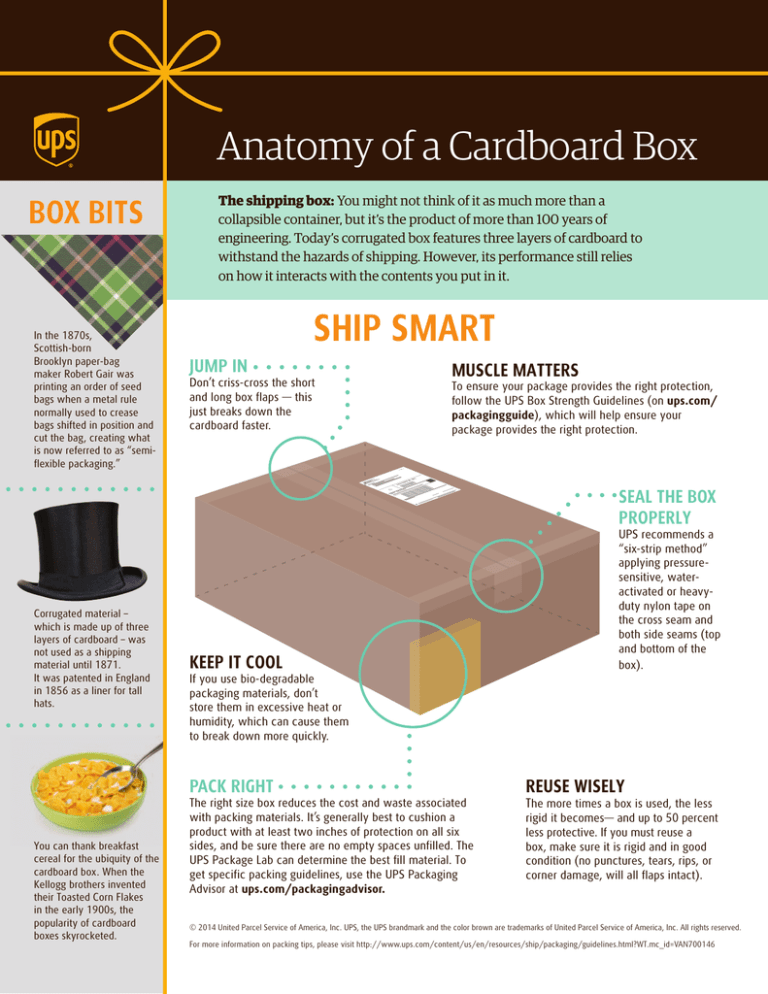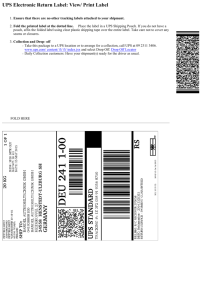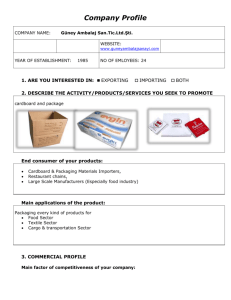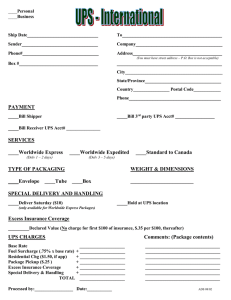
Anatomy of a Cardboard Box
BOX BITS
In the 1870s,
Scottish-born
Brooklyn paper-bag
maker Robert Gair was
printing an order of seed
bags when a metal rule
normally used to crease
bags shifted in position and
cut the bag, creating what
is now referred to as “semiflexible packaging.”
The shipping box: You might not think of it as much more than a
collapsible container, but it’s the product of more than 100 years of
engineering. Today’s corrugated box features three layers of cardboard to
withstand the hazards of shipping. However, its performance still relies
on how it interacts with the contents you put in it.
SHIP SMART
JUMP IN
Don’t criss-cross the short
and long box flaps — this
just breaks down the
cardboard faster.
MUSCLE MATTERS
To ensure your package provides the right protection,
follow the UPS Box Strength Guidelines (on ups.com/
packagingguide), which will help ensure your
package provides the right protection.
SEAL THE BOX
PROPERLY
Corrugated material –
which is made up of three
layers of cardboard – was
not used as a shipping
material until 1871.
It was patented in England
in 1856 as a liner for tall
hats.
KEEP IT COOL
If you use bio-degradable
packaging materials, don’t
store them in excessive heat or
humidity, which can cause them
to break down more quickly.
PACK RIGHT
You can thank breakfast
cereal for the ubiquity of the
cardboard box. When the
Kellogg brothers invented
their Toasted Corn Flakes
in the early 1900s, the
popularity of cardboard
boxes skyrocketed.
The right size box reduces the cost and waste associated
with packing materials. It’s generally best to cushion a
product with at least two inches of protection on all six
sides, and be sure there are no empty spaces unfilled. The
UPS Package Lab can determine the best fill material. To
get specific packing guidelines, use the UPS Packaging
Advisor at ups.com/packagingadvisor.
UPS recommends a
“six-strip method”
applying pressuresensitive, wateractivated or heavyduty nylon tape on
the cross seam and
both side seams (top
and bottom of the
box).
REUSE WISELY
The more times a box is used, the less
rigid it becomes— and up to 50 percent
less protective. If you must reuse a
box, make sure it is rigid and in good
condition (no punctures, tears, rips, or
corner damage, will all flaps intact).
© 2014 United Parcel Service of America, Inc. UPS, the UPS brandmark and the color brown are trademarks of United Parcel Service of America, Inc. All rights reserved.
For more information on packing tips, please visit http://www.ups.com/content/us/en/resources/ship/packaging/guidelines.html?WT.mc_id=VAN700146



